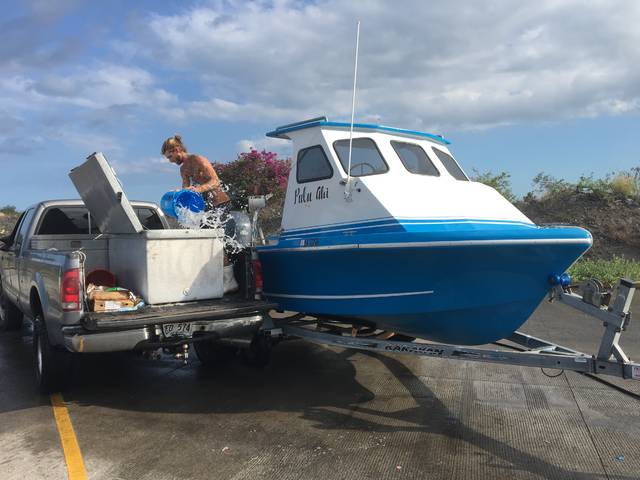HONOKOHAU — Commercial fisherman Tyler Hams makes his living on the water, and that living depends on keeping saltwater out of his motor and his equipment clean.
For that, he needs fresh water.
“I mean, I get it that there’s a water restriction,” Hams said at Honokohau Harbor on Friday. “This is how we make our living.”
Hams was one of many boaters and fishermen at the harbor on Friday who said an emergency restriction on water usage issued the day prior that ordered a halt on washing boats was unworkable.
The notice came down following the failure of the Keahuolu Deepwell and asks North Kona residents and customers to immediately restrict water usage to health and sanitation uses. Four other wells of the 13 that service the area have been inoperable since January.
A separate announcement from the mayor’s office said North Kona residents “must cease all other non-essential water use, including all irrigation and washing of vehicles and boats.”
In an update released Friday afternoon by the Hawaii County Department of Water Supply, the department said the restriction remains in effect and that North Kona residents and customers must continue to restrict their use of water to health and safety purposes.
The makai boundary of that area runs from the Sheraton Kona Resort &Spa at Keauhou Bay north to the Ellison Onizuka Kona International Airport at Keahole, while the mauka boundary runs from the juncture of Highways 11 and 180 north to the Makalei Fire Station.
Friday’s announcement said repairs are expected to be completed within a week and a half and that there have been no reports of lost water service.
Hams said he wasn’t aware of the restrictions Friday while flushing out his motor at Honokohau Harbor and agreed boaters, fishermen and others at the harbor should do what they can to prevent waste and be efficient. But, he said, he needs water to flush out the motor to prevent corrosion and to wash out his boxes to prevent the growth of mold and bacteria.
“Cutting it out completely, we’re not going to be able to do our jobs,” Hams said. “No way.”
Hams isn’t the only one feeling that way. Other boaters at the harbor also said they weren’t going to stop doing what they needed to keep their livelihoods afloat.
“We’re trying to comply,” said Robert Oswald, a recreational boater. “I think we’re doing our part; now let the county step up and do their part.”
He said he’s already been cutting back on water usage by taking actions like reducing irrigation at his home, hand-watering and collecting rainwater.
“And I rarely wash the vehicles,” he added.
Oswald criticized the county for letting it get to this point, given that the Keahuolu Deepwell is the fifth one to be down.
That same well just underwent repairs that finished in January.
Keith Okamoto, manager and chief engineer with DWS on Hawaii Island, said the department believes the failure is the result of something binding the pump, but they really won’t know for sure until the pump and motor get to the surface. At that time they’ll get a better idea of what exactly went wrong and with whom responsibility lies.
“We’ll get to that point about who’s taking responsibility for what when we get a chance to take a breather,” Okamoto said.
The county’s update said removal of the pump and motor began Friday.
But Oswald and other boaters said they need to be able to use the water to prevent saltwater from wreaking havoc on their vessels.
Patrice Heller, who owns a diving charter, said that as a business owner, there’s no questioning the need to wash their vessels.
“It would be so detrimental to our businesses and our boats to not get washed,” she said.
Heller, who was also at the harbor Friday morning, said she recognizes the need for conserving water given that she lives on catchment.
“We use only what we need and we don’t waste,” she said.
Down at the harbor, she added, harbor regulations make sure water is used efficiently.
Signs posted in the boat wash area remind boaters to keep their washes brief and restricts anybody from using water for washing cars.
The harbor management also encourages the use of nozzles on hoses to avoid water freely pouring out on to the ground when not being used to wash down a vessel.
“So they really are doing their part to minimize the overuse and wasting,” Heller said.
Sen. Josh Green, meanwhile, wrote to the governor Friday afternoon, asking him to declare a state of emergency “to prevent a potential catastrophe and to ensure the continued safety of the people of West Hawaii.”
Green said in an interview that he has been hearing concerns about water from constituents and that a declaration could open up the mobilization of people and resources to fix the problem.
Still, some boaters said they’re willing to make some changes.
Casey Chai of Honokaa said he goes out fishing with friends about once a week and that new restrictions wouldn’t affect him too much, saying he could just take the boat back home to wash.
“I’d way rather just do it here,” he said. “But if they said, ‘no,’ I wouldn’t bat an eye.”
Repairs at four other wells in the area are scheduled to finish at various points throughout this year.
Okamoto said the reason repairs are taking too long is a result of the manufacturing process for needed parts, which are often specific to the individual wells.
He said that getting ahead of those repairs and ensuring they have the needed parts is “what we’re gonna do, hopefully, a better job of.”
That includes having spare parts for “critical well sites” and looking at whether some parts can be interchangeable. Okamoto, however, said different wells have different requirements based on, for example, the height to which they have to pump water.






